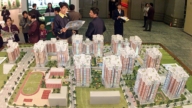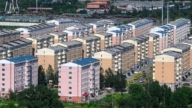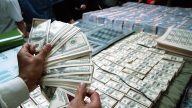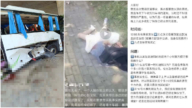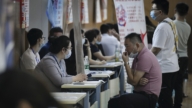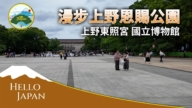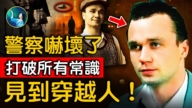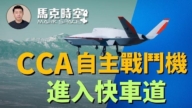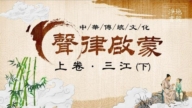【新唐人2012年12月19日訊】近兩天中共中央召開的經濟工作會議,釋放了一個重要的信號,那就是:「城鎮化」將是明年中共當局經濟工作的重要抓手。專家指出,自中共執政以來,中共把中國農民變成了二等公民,而在中國經濟面臨舉步維艱,社會矛盾一觸即發的情況下,又採用「擴大城鎮化」的辦法,把農民賴以生存的土地用來生錢,將會使失去土地而又文化層次不高的農民再次面臨生存問題,會更加激化社會矛盾。
下任中共國務院總理李克強,在面向省部級官員的培訓班上,曾作出如下說法,他說:潛力巨大的中國城鎮化,是中國經濟增長最強大、最持久的內生動力。
據《中新網》報導,多位專家16號表示,這象徵新型城鎮化,被定位為中國經濟新的增長點,是改革的重要紅利,也將是明年經濟工作的重要抓手。
北京《國情內參》期刊首席研究員鞏勝利指出,中共的這一舉措,是再一次把不可再生的土地資源變成更多的金錢,在農民面臨巨大經濟壓力的同時,再一次犧牲農民的利益。
北京《國情內參》首席研究員鞏勝利:「政府收購農民的土地,一畝地大概幾千塊錢,上萬塊錢,城鎮化以後,房地產大概一平米幾千到上萬,政府反覆炒買土地,變成城鎮土地了,就翻了上千倍,上百倍。」
鞏勝利指出,中共政府把農民土地變成城鎮土地,農民將無處可去。
鞏勝利:「農民沒有了土地怎麼樣生存,這是個很關鍵的問題,這個經濟會議,對於2013來講,是中國的矛戳中國的盾。農民沒有了土地,進城他去幹甚麼?他能幹甚麼?」
李克強在會議上還說,擴大城鎮化將帶來投資的大幅增長和消費的快速增加。但是,美國「紐約城市大學」經濟學教授陳志飛認為,擴大城鎮化是李克強為了縮小中國的貧富差距和低迷樓市的無奈之舉,只能是畫餅充飢。
美國「紐約城市大學」經濟學教授陳志飛:「但實際上,流動人口、買房的人口還不到1%,造成的結果可能是使資源更加浪費,更多的錢可能會浪費在一些表面光鮮的工程上,因為農村人口進城找不到工作,或小孩子得不到上學的機會,各方面配套的工程達不到預期的效果,那麼這些常駐的人口畢竟造成不滿,甚至造成一些社會矛盾的突出。」
陳志飛說,中國的貧富差距,達到了相當於非洲那些完全依靠外援的畸形經濟一樣,是因為中國的特權階層借改革開放之名,大肆攫取國家資源、搜刮民脂民膏造成的,只要中共在臺上,這個差距只會擴大,中共想靠擴大城鎮化來縮小貧富差距,只能是癡人夢想。
陳志飛:「如果想讓他們來拉動內需,其實是癡人夢想,因為這些民工或者是這些剛湧入城市的人,他們不可能去買那些昂貴的奢侈品,也不會像富豪一樣去購買多處房產,或者像中共黨官一樣去揮霍國家財產,遊山玩水,甚至搞二奶、三奶的來擴大內需。」
那麼,在不包括中國權貴隱性資本的情況下,代表社會公平的「基尼指數」,中國卻已經超過0.6,遠遠高於聯合國的底線0.4,據陳志飛研究,中國的基尼指數已經排在全球前十位。
專家們認為,不擴大城鎮化建設,中國貧富差距越來越大,已經危及到中共的執政地位,城鎮化建設又可能導致失地農民的一系列問題,加上城鎮化的過程中,特權階層又會搜刮民眾一把,暗藏著更深層的危機。
採訪編輯/劉惠 後製/鍾元
Farmers having to sacrifice land for expanding urbanization
triggered a big reaction
Over the past two days the Chinese Communism Central
Economic Conference made it clear that economic work will start with “urbanization" next year.
Experts say, since the Chinese Communist Party(CCP) came
to power, Chinese farmers became second-class citizens.
While China’s economy is facing social conflicts everywhere,
now the regime wants to expand urbanization.
This will cause the farmers to lose their land which they rely on.
Again farmers will face the challenge of surviving.
Thus, more social contradictions are intensified.
CCP Premier Li Keqiang said in training for provincial officials,
“the huge potential of China’s urbanization will bring the most
power and lasting motivation for economic growth.”
Chinanews reported that experts stated on Dec 16th that new
urbanization is positioned as a growth point in China’s economy.
It will also be the important starting point
for next year’s economic work.
Gong Shengli, principal researcher of
“Internal References Of National Conditions” pointed out,
this initiative of the CCP once again changed the
non-renewable resources of the land to more money; and sacrificed the interests of farmers.
Farmers who are already facing enormous
economic pressures.
Gong Shengli: “The government bought the farmers’ land
for thousands of yuan per acre, or tens of thousands of yuan.
After urbanization, for real estate, it is about a few thousands
to tens of thousands of yuan per square meter.
The CCP repeatedly scrambled to buy land, and the previous
one acre of farmland changed into urban land.
This made it worth many hundreds or thousands of times more."
Gong Shengli pointed out that the CCP government changed
the farmers land into urban land, leaving the farmers nothing.
Gong Shengli: “How could the farmers survive
without lands? This is the most critical issue.
The 2013 economic conference is using a Chinese spear
to poke a Chinese shield.
After the farmers lost their land, and went barefoot into the city,
what will they do? What can you do?"
Li Keqiang also said at the meeting that urbanization increase
will bring a rapid increase in investment and consumption.
However, Chen Zhifei, a professor of Economics in New York
City University believes expanding urbanization is a way for
Li Keqiang to narrow the gap between rich and poor and change
the downturn in the property market, but it’s an illusion.
Professor Chen Zhifei: “For the floating population, less than
1% bought houses, resulting in more wasting of resources.
More money may be wasted in some superficially
outstanding projects.
However the rural population could not find a job in the city,
their children could not go to school.
Related projects could not reach exptected results. The residential
population will have dissatisfaction, causing even more conflicts."
Chen Zhifei said, the gap between rich and poor in China
had reached a level of deformed economics.
Becoming totally dependent on foreign aid like in Africa.
The privileged class grabbed national resources and
people’s wealth in the name of reform and opening up.
This gap will only expand as long as the CCP exists.
It is only an illusion to narrow the gap between
the rich and the poor by expanding urbanization.
Chen Zhifei: “If you want them to boost domestic demand,
it is only a dream.
These migrant workers, or people who just walk into the city,
cannot buy those expensive luxuries like more properties.
Or squander state treasures, or go on sightseeing tours, or
take mistresses like CCP officials to expand domestic demand."
The Gini index is a measurement of income distribution of
a country’s residents to define the gap between rich and poor.
Zero equals perfect balance of income distribution.
Excluding the recessive capital of Chinese dignitaries, the Gini
index representing social justice has exceeded 0.6 in China.
This is much higher than the bottom line of
the United Nations of 0.4.
According to Chen’s study, China’s Gini index
has been ranked in the top ten in the world.
Experts believe that, if not expanding urbanization,
the gap between rich and poor will grow in China.
This has already threatened the CCP’s ruling status.
But urbanization may cause a series of problems
for the landless peasants;
in the process of urbanization, the privileged class will
plunder the people further, so a deeper crisis is hidden.


